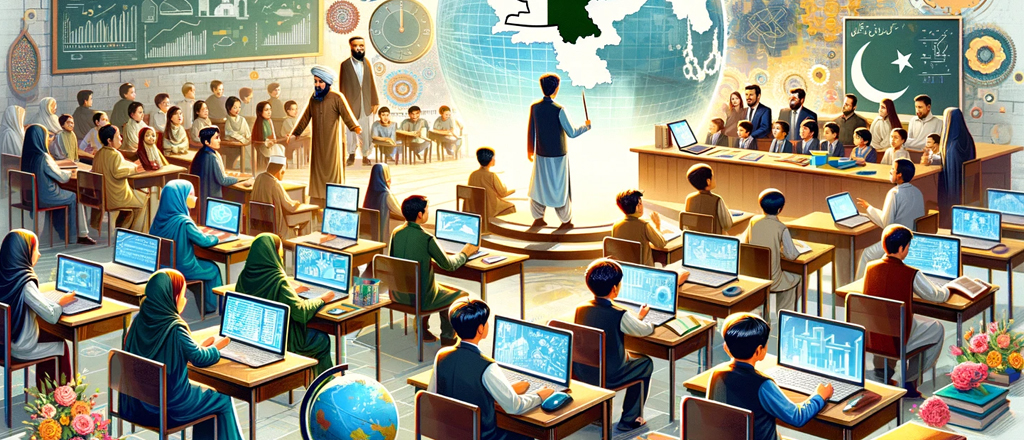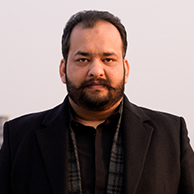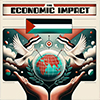A Comprehensive Analysis of the Education System in Pakistan

Introduction
Education involves the acquisition of knowledge, development of skills, techniques, and the ability to comprehend societal responsibilities, norms, and culture. It holds significance in fostering individual and national progress, elevating human development, improving living standards, and enhancing the overall well-being of society.
Education stands as a pivotal element in transforming a nation from its current state into a distinguished position among the community of nations. The progress in education and the skills acquired thus far not only contribute to the betterment of Pakistan but also positively impact the surrounding regions.
An effective education system empowers a nation to attain its national objectives. However, Pakistan, as a developing country, has encountered significant challenges in education since its establishment, resulting in the failure of the education system to meet the aspirations of the nation.
The literacy rate in Pakistan hovers at approximately 62.8%, primarily attributable to multiple shortcomings in the education system. Additionally, the allocated budget for education is a mere 1.7% of the GDP, falling below the regional average and lagging behind other countries in the vicinity.
This article aims to offer a comprehensive examination of Pakistan's education system, highlighting its challenges, and presenting recommendations to address these issues for the creation of an improved educational environment.
Importance of Education
In the contemporary and advanced age, education is imperative for thriving in a competitive world. It stands as a fundamental necessity in the lives of individuals and is crucial for the development of a country. Educated individuals possess a sense of responsibility and are well-informed about their personal, societal, and national rights. Through education, people gain an understanding of their duties and responsibilities, actively contributing to the improvement of their homeland.
Education serves as the nurturing and enriching force behind the establishment of a robust and notable societal structure, fostering prominent development and significant growth for the country. It delves into new dimensions, refining the latent talent, and strengths of individuals, channeling these forces towards the ascent of Pakistan as a formidable nation on the global stage.
A superior education system cultivates skilled leaders, politicians, and scientists, whose expertise plays a pivotal role in the development of the country. Education is a crucial factor in a nation's progress, influencing social, economic, political, and structural development. A more effective educational system has the potential to eliminate various societal problems. The following are key attributes of education.
- Protection against criminal activities:
A society with a high level of education, experiences lower crime rates compared to an uneducated society. Educated individuals have greater earning opportunities, enabling them to lead civilized lives and reducing the likelihood of engaging in criminal activities. Their awareness of the surrounding environment makes them less susceptible to scams or deception.
- Eliminating Poverty and Unemployment:
Education assists individuals in acquiring improved skills and knowledge for better employment prospects. It offers earning opportunities, enabling individuals to lift their families out of poverty. Educated individuals benefit from a broader range of job opportunities compared to the uneducated, contributing to higher employment rates and a reduction in unemployment within the country.
- Women Empowerment:
The empowerment of women is crucial for the social development of a nation. Education grants fundamental rights to women, allowing them to lead better lives in society. Women empowerment addresses various societal issues, such as child marriages, dowry, and social injustice towards women. A society cannot progress without the empowerment of women.
- Social Development:
Educated individuals possess an understanding of their own rights as well as those of others, facilitating a peaceful coexistence in society. Moral and ethical conduct plays a vital role in the effective functioning of a society.
Education system of Pakistan
In Pakistan, the prevalent educational institutions are primarily categorized into three types: Private sector, Public sector, and Deeni Madaris. These distinctions encompass variations in education quality, teaching methodologies, curriculum, examination systems, and basic facilities.
Public institutions constitute 62%, catering to the educational needs of 56% about 28.49 million students. The private sector comprises 38% of the institutions, serving 44% about 22.70 million of the students, which includes 4.369 million students studied in over 31 thousand Deeni Madaris.
The major provider of educational services in Pakistan is the public sector; however, a majority of schools in the country are primarily focused on primary education. There is a scarcity of middle and secondary schools in rural areas, posing challenges to universal access to education.
The private and public sectors adhere to distinct curriculums, and this divergence extends to the provincial level as well. Schools in Punjab, Khyber Pakhtunkhwa, Baluchistan, and Sindh, whether public or private, follow separate curriculum. The provincial literacy rates stand at 66.3% in Punjab, 61.8% in Sindh, 55.1% in Khyber Pakhtunkhwa, and 54.5% in Baluchistan.
- Initiatives for Educational Services at National and Provincial Level:
According to article 25-A of Pakistan's constitution, it state's responsibility to provide free and compulsory education to Children from age 5 to 16 years. In light of this article of Constitution Federal and Provincial governments has initiated several flagship initiatives to improve the quality of education through provision of basic resources in educational institutes, allocation of stipend, Scholarships, Laptop schemes etc.
- Federal:
Federal Government introduced Pakistan Education Policy to enhance education at each level. Relative grading system and modernization of examination processing system were also introduced. Moreover, to enhance skills of youth, Programmes like "Hunarmand Nojawan", 'Prime Minister's Kamyab Jawan National Youth Development Programme' Prime Minister Laptop Schemes were also launched.
- Punjab:
Punjab government introduced educational projects at large scale. Punjab Education Foundation project launched with Public-Private partnership to encourage and support underprivileged students to avail affordable educational opportunities. Other major educational projects in Punjab includes Education Voucher Scheme, Danish Schools, Cholistan Mobile Schools, Public School Support Programme, Taleem Sub K Liye and Free MBBS Education.
- Khyber Pakhtunkhwa (KPK):
The government of KPK had initiated The Iqra Farogh e Taleem Education Voucher scheme by allocation of Rs.500 million to provide educational services to those areas where public schools are not available. This voucher scheme was extended to 25 districts of province. Funds are also allocated to build schools infrastructure with basic necessities. Moreover, to meet the teacher student ratio more teachers were recruited.
- Sindh:
Sindh education department has launched Biometric verification of teachers to ensure their attendance in educational institutes, Free books schemes were also introduced for public schools. Additionally, fixed stipend for girls were also introduced to compensate them in educational expenses.
- Balochistan:
Balochistan government with collaboration of USAID, UNESCO, UNICEF and European Union launched various initiatives in the province to tackle education crisis. In Balochistan Balochistan Education Management Information System (BEMIS) were launched which is responsible for collection, analysis and monitoring of educational data. Provincial Institute for Teacher Education (PITE) were launched to provide training to teachers. Balochistan Education Foundation (BEF) was formed with public private partnership to provide education in areas where there is no school available. Pakistan has experienced improvement in educational sector, however with slow pace. Despite these initiatives on national and provincial level there is still need to fully utilize available resources to overcome challenges in educational sector that will result in achievement of satisfactory literacy rate in the region.
Problems in Education system of Pakistan
Pakistan ranks as the 5th most populous country, with over 60% of its population being youth. Despite this demographic, the overall literacy rate in Pakistan stands at approximately 62.8%, with a higher percentage among males at 73% and females at 51%.
Since its inception, Pakistan has struggled to institute an education system that aligns with the aspirations of the general public. As a developing country, Pakistan grapples with a myriad of challenges and issues within the education sector.
Pakistan encounters various problems and challenges within its educational system. Some of these issues are outlined below:
- Low-Budget Allocation:
Pakistan is among those nations that allocate a comparatively smaller budget for education. At 1.7% of the GDP, the allocation for the education sector is the lowest in the region. This budget is insufficient to meet the needs of the large population. Factors such as the limited use of advanced technology, low salaries, and high taxes contribute to the sluggish growth in the education sector.
- Out of School Children:
According to education statistics, over 32% of children are not currently enrolled in schools. This includes more than 37% of females and 27% of males who are out of school. At the provincial level, the figures stand at 24% for Punjab, 44% for Sindh, 47% for Khyber Pakhtunkhwa, and 47% for Baluchistan in terms of children not attending school. These disparities between male and female education across all provinces highlighting the overall challenges in achieving education attainment.
- Quality of Education:
The quality of education in Pakistan is significantly compromised due to the lack of essential resources such as proper equipment, teaching staff, and basic facilities like water, electricity, and sanitation. Moreover, the teaching staff is inadequately trained and struggles to impart the necessary knowledge and skills to students. The outdated curriculum is a major hindrance to professional development. Public schools, in particular, face challenges as they often have only one teacher for numerous students, resulting in a lack of teacher's attention to enhance the reading and writing abilities of each student.
- Disparities in Curriculum:
Educational institutions in the public and private sectors adhere to distinct curriculum. Public institutions typically follow an outdated curriculum that lacks the requisite skills and knowledge needed for the modern world. In contrast, private schools often adopt the British school system. This discrepancy in educational curriculum contributes to variations in knowledge and skills between students attending public and private schools.
- High Cost of Education:
In rural areas, only primary public schools are accessible to the population, while secondary and higher secondary schools are situated at a considerable distance from villages and towns. The rural population, being economically disadvantaged, cannot afford the high transportation fees required for access to higher education. Consequently, instead of sending their children to schools located far away, they opt to engage them in work to earn money. On the other hand, private institute fees, along with the costs of stationary, uniforms, and books, are very high, making education unaffordable for poor families.
- Female Education:
Educational facilities for females are present in urban areas; however, in rural areas, schools and colleges for females are scarce. Additionally, many parents are hesitant to allow their daughters to pursue education, preferring instead that they acquire family skills and engage in household chores. Concerns about the harassment of female students in educational institutions further discourage parents from sending their daughters to study.
Recommendations
Efforts must be undertaken to address and surmount the issues and challenges in Pakistan's education sector. The following recommendations and suggestions are proposed:
- Implementing educational reforms is the sole solution to effectively tackle educational issues. Government officials, Education Ministers, policymakers, educational experts, and thinkers must actively participate in crafting policies that ensure widespread access to education throughout the country.
- The government should raise the budget for the education sector to meet international standards, starting with gradual increase to 4%, and subsequently adjusting it according to the Education sector's requirements.
- Policy makers and the government should introduce policies and initiatives aiming at enrolling out-of-school children. Awareness campaigns should be initiated to educate parents about the importance of education for their children. New laws should be created and existing laws should be enforced to ensure the enrolment of children in schools.
- Child labour should be discouraged and people involved in child labour should be punished according to the International laws.
- Teaching staff should undergo training by professional trainers, and dedicated funds should be allocated for their professional development to enhance their knowledge and skills.
- There should be a standardized curriculum across all educational institutes in the country to ensure a consistent level of education. The curriculum should be revised and updated on an annual basis to align with international standards.
- Students should be provided with free or low-cost transportation to access educational institutes situated far from their homes. There should be effective oversight and regulation of fees and expenses in private educational institutes to make education affordable for all individuals in the nation.
- Schools and colleges should be established in every town in the country to ensure the availability of education facilities for females. Additionally, the government and educational institutes must prioritize the safety of female students and staff, taking measures to prevent harassment and providing a secure environment for them.
- Fully funded Scholarships for graduation and Post-Graduation should be introduced in all universities for needy students.
Conclusion
Education holds significance not only for economic benefits but also for addressing various other issues in the country, including political, psychological, social, ethical, legal, and spiritual aspects of life. It contributes to the social and human development of individuals. Pakistan, being a developing country with the 5th largest population globally, faces challenges in achieving a satisfactory literacy rate. While there have been improvements in the education system over the years. Consequently, there is a pressing need to prioritize the educational sector, ensuring that educational facilities are accessible to every child in the nation.
Pakistanis are inherently talented and intelligent, but their potential requires proper training and recognition through education. No country can achieve sustainable growth and development without educating its population. As a nation, Pakistan must address this issue and exert efforts to overcome challenges in the educational sector. Educated and well-trained youth can play a pivotal role in the overall development of the country.
Ovais Ali Khokhar, as Founder and CEO of House of Elaan & Ovaisco Group, has revolutionized the real estate industry with innovative strategies that blend marketing, investment, legal services, and creativity. His efforts in international relations have led to significant global partnerships. He is deeply invested in youth empowerment, aiming to nurture the next generation of leaders and drive forward a resilient and vibrant future. His work is characterized by a strong commitment to collaboration, innovation, and a vision for a globally connected, sustainable future.







